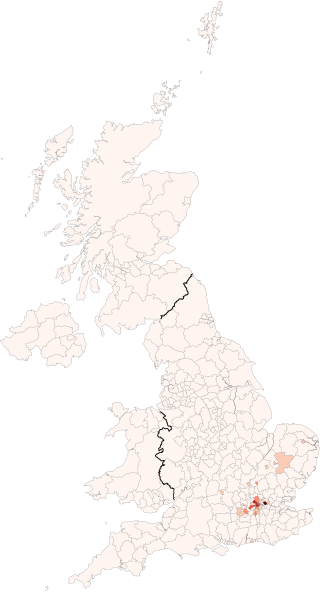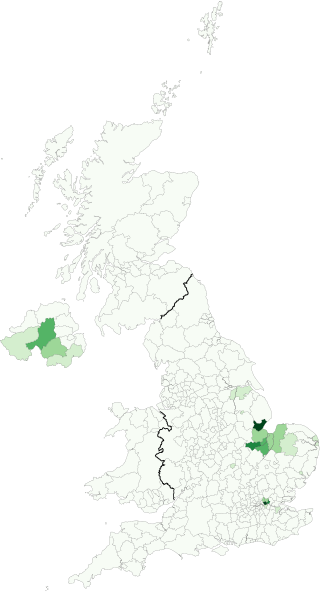Australians in the United Kingdom, or Australian Britons, include Australians who have become residents or citizens of the United Kingdom. The largest segment of Australia's diaspora of 1 million resides in the United Kingdom.
British Nigerians have formed long-established communities in London, Liverpool and other industrial cities. Many Nigerians and their British-born descendants in Britain live in South London, and they are one of the larger immigrant groups in the country.
Germans in the United Kingdom form one of the largest minority groups in the country. Today, there are many Germans living in the United Kingdom, and many Britons or German British have German ancestry, including the British royal family. While those born in Germany constitute one of the UK's largest foreign-born groups, many are British nationals, rather than German nationals, who were born in Germany to British military personnel based there.

French migration to the United Kingdom is a phenomenon that has occurred at various points in history. The Norman Conquest of England by William the Conqueror in 1066 resulted in the arrival of Normans, while in the 16th and 17th centuries Protestant Huguenots fled religious persecution to East London. Other waves are associated with monasticism, particularly post-conquest Benedictines and Cistercians, aristocracy fleeing the French Revolution, expulsion of religious orders by Third Republic France, and current expats.

Filipinos in the United Kingdom are British citizens or immigrants who are of Filipino ancestry.

Spaniards in the United Kingdom are people of Spanish descent resident in Britain. They may be British citizens or non-citizen immigrants.

Portuguese in the United Kingdom are citizens or residents of the UK who are connected to the country of Portugal by birth, descent or citizenship.
Ukrainians in the United Kingdom consist mainly of British citizens of Ukrainian descent.

Americans in the United Kingdom or American Britons are emigrants from the United States who are residents or citizens of the United Kingdom.
Zimbabweans Britons are British people who were born in Zimbabwe or can trace their ancestry to immigrants from Zimbabwe who emigrated to the United Kingdom. While the first natives of the country then known as Southern Rhodesia arrived in Britain in larger numbers from the late-1960s, the majority of immigrants arrived during the 1990s and 2000s. The Zimbabwean community in the UK is extremely diverse, consisting of individuals of differing racial, ethnic, class, and political groups. There are a diverse mix of asylum seekers, professionals, investors, businesspeople, labour migrants, students, graduates, undocumented migrants, and others who have gained British citizenship.
Kenyan migration to the United Kingdom has been occurring for many decades. As a result, many people in the UK were born in Kenya, or have Kenyan ancestry. Many Kenyan people who migrated to the UK are of South Asian extraction.

South Africans in the United Kingdom include citizens and residents of the United Kingdom with origins in South Africa.

Singaporeans in the United Kingdom may refer to people who have full or partial Singaporean origin or descent, born or settled in the United Kingdom, or Singaporeans in Britain which are high-income expatriate professionals as well as skilled workers, with many still maintaining close ties with Singapore, especially those who continue to retain Singaporean citizenship while having permanent residency in Britain, as well as students.
Malaysians in the United Kingdom are British citizens who have full or partial Malaysian origin or descent and Malaysian citizens residing in the United Kingdom. The 2001 UK Census recorded 49,886 Malaysian-born people. The 2011 census recorded 62,396 people born in Malaysia living in England, 2,117 in Wales, 4,721 in Scotland and 705 in Northern Ireland. The largest concentrations of Malaysian-born residents were recorded in Greater London and South East England (11,331). The Office for National Statistics estimates that 75,000 Malaysian-born expatriates were residents in the UK in 2017.

Romanians in the United Kingdom refers to Romanian immigrants in the United Kingdom, both citizens and non-citizens, along with British citizens of Romanian ancestry. The number of Romanian-born people resident in the UK has risen from 83,168 at the time of the 2011 United Kingdom census to 538,840 in England and Wales alone in 2021.
The British Cypriot community in the United Kingdom consists of British people born on, or with ancestors from, the Eastern Mediterranean island of Cyprus. British Cypriot people may be of Greek, Turkish, Maronite, or Armenian descent.
Hong Kongers in the United Kingdom are people from Hong Kong who are residing in the United Kingdom or British nationals of Hong Kong origin or descent.
British Afghans are British citizens and non-citizen residents born in or with ancestors from, Afghanistan, part of worldwide Afghan diaspora. The Office for National Statistics (ONS) estimates that there were 79,000 people born in Afghanistan living in the UK in 2019.

According to ONS estimates in 2019 there were 76,000 Nepalese-born people in the United Kingdom.

Lithuanians in the United Kingdom include individuals born in Lithuania who have migrated to the UK, among them Lithuanian citizens of Russian descent and Polish Lithuanian citizens, as well as their British-born descendants. The 2011 UK Census recorded 95,730 Lithuanian-born residents in England, 1,353 in Wales, 4,287 in Scotland, and 7,341 in Northern Ireland. The previous, 2001 UK Census, had recorded 4,363 Lithuanian-born residents. The Office for National Statistics estimates that 144,000 Lithuanian-born immigrants were resident in the UK in 2013.










